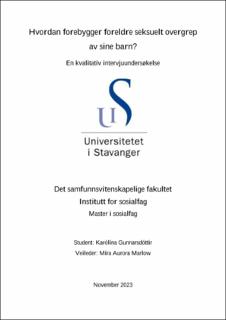| dc.contributor.advisor | Marlow, Mira Aurora | |
| dc.contributor.author | Gunnarsdóttir, Karólína | |
| dc.date.accessioned | 2023-12-29T16:51:13Z | |
| dc.date.available | 2023-12-29T16:51:13Z | |
| dc.date.issued | 2023 | |
| dc.identifier | no.uis:inspera:178933020:34469707 | |
| dc.identifier.uri | https://hdl.handle.net/11250/3109164 | |
| dc.description.abstract | Forskninger og rapporter viser at fysisk og digitalt seksuelle overgrep av barn har økt betydelig de siste årene, noe som kan kalles et alvorlig samfunnsproblem. Denne masteroppgaven retter fokus mot hvordan foreldre forebygger mot seksuelle overgrep av barn. Studiens hensikt har vært å beskrive og drøfte oppgavens funn ut ifra teori og tidligere forskning. For å besvare spørsmålene har det blitt gjennomført kvalitative semistrukturert intervju av sex foreldre av barn på første til fjerde trinn i barneskole. I studien ble det vektlagt å synliggjøre 1) når og hvordan forebyggende arbeid pågår i hjemmet, 2) hvor foreldrenes kunnskap kom ifra, 3) foreldrenes forventinger til skolene og 4) hvilke fysiske, psykiske og samfunnsøkonomiske konsekvenser kan oppstå når barn blir seksuelt misbrukt. Intervjuene er analysert ved hjelp av Interpretative Phenomenological Analysis (IPA).
Funnene viser at informantene fikk liten opplæring i egen barndom om seksuelle overgrep, både i hjemmet og på skolen. I tillegg viser funnen at det oppstår to typer av forebygging i hjemmet. Den første er at informantene velger å vente til barn spør dem om tematikken, og den andre er at informantene bruker ytre faktorer til å åpne dialogen med sine barn om seksualitet og seksuelle overgrep. Det å føle det ubehagelig å snakke med barn om seksuelt overgrep, er en felles følelse blant informantene. Alle informantene har derfor store forventinger til skolens forebyggende arbeid og føler det viktig at læreren har kunnskap og kompetanse til å snakke med deres barn om temaet. Funnen viser at foreldrene ønsker to typer av kunnskap og ferdigheter. For det første var det å kunne kjenne tegn barn viser når det har vært utsatt for seksuelle overgrep, og for det andre ferdighetene å snakke med barn om tematikken, hvor de føler seg ikke rustet nok til det arbeidet. Med søkelys på konsekvensene seksuelle overgrep har på barn og samfunnet, kan avdekking og forebygging i hjemmet, så tidlig som fra svangerskap, stoppe den betydelige økningen av seksuelle overgrep av barn. For å få disse endringene, må vi strebe for endringer på samfunnsnivå, hvor seksuelle overgrep mot barn er et alvorlig samfunnsproblem. | |
| dc.description.abstract | This master thesis focuses on how parents prevent sexual abuse of a child. In order to answer the questions, a qualitative semi-structured interview has been conducted with six parents of a child in the first to fourth year of Primary School. In the study, it was emphasized to find out 1) when and how preventive work takes place in the home, 2) where the parent's knowledge comes from, 3) the parent's expectations for the school and 4) which physical, psychological and socio-economic consequences can occur when a child is sexually abused. The interviews are analyzed with the help of Interpretative Phenomenological Analysis (IPA).
The findings show that the informants received little education about sexual abuse in their own childhood, both at home and at school. In addition, the findings show that there are two types of preventive work in the home. The first is that the informants choose to wait until the child asks them about the topic, and the second is that the informants use external factors to open the dialogue with their child about sexuality and sexual abuse. Feeling uncomfortable talking to a child about sexual abuse is a common feeling among the informants. All the informants therefore have high expectations for the school's preventive work and feel it is important that the teachers have the knowledge and competence to talk to their child about the topic. The findings show that parents want to improve their knowledge and skills. Firstly, knowing the signs a child shows when they have been subjected to sexual abuse, and secondly, having the ability to talk to a child about about sexuality and sexual abuse. | |
| dc.language | nob | |
| dc.publisher | uis | |
| dc.title | Hvordan forebygger foreldre seksuelt overgrep av sine barn? | |
| dc.type | Master thesis | |
